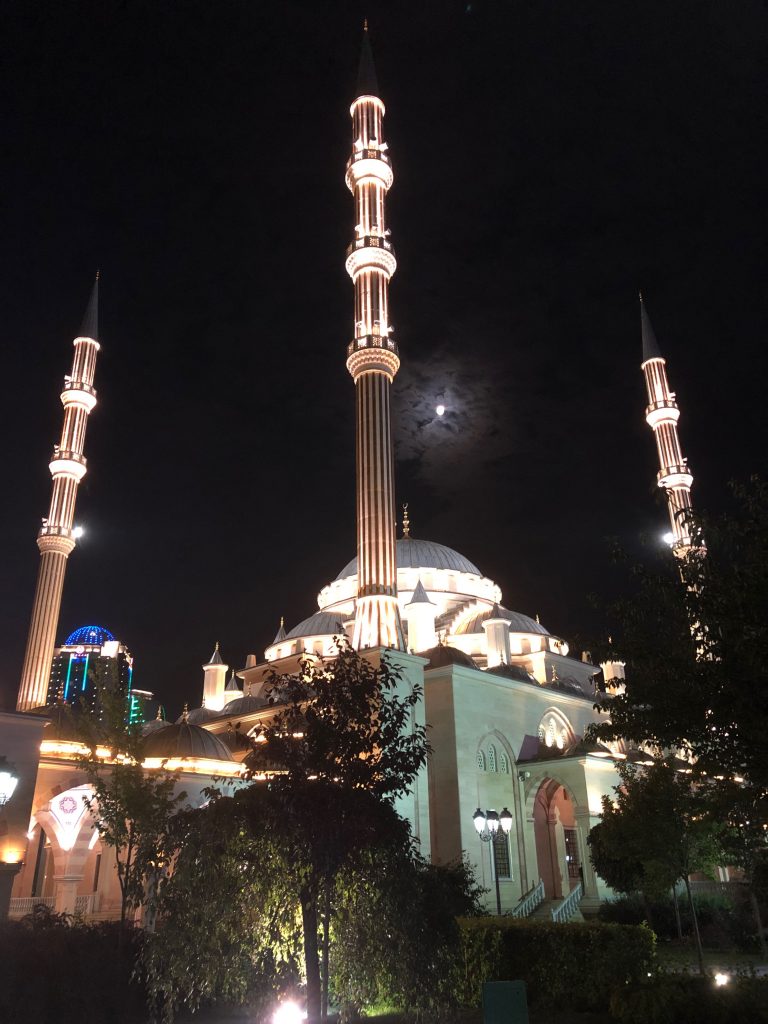
GROZNY, Chechnya
I have to admit I was hesitant when asked to participate in a 10-day “cultural tour” of Chechnya in the northern Caucasus.
Isn’t this the place where they kidnap, torture and kill people, a mafia state that has become an international byword for brutality and deprivation? But upon being assured of my physical safety, I agreed to go. I’m glad I did. The experience was eye-opening.
The Western press has spent much time detailing the negative charges laid against Chechen leader Ramzan Kadyrov’s government; I don’t want to do that. I’ll focus on what I saw and experienced first-hand with the Chechen people.
The reader needs to first understand that this is an ancient culture, forged in the insular mountain region of the Caucasus over many centuries. These people are warriors — the “Spartans of the Caucuses” — and they live by a code of honor. Their national symbol, a stone watch tower placed throughout the region to warn of approaching threats, is singularly appropriate.
Chechen society consists of a series of clans to which members give their allegiance. Family is everything. Knowing one’s heritage is of paramount importance for Chechen men. There is a beauty in that. Within a framework of Islam, women, far from being persecuted, are cherished as the caretakers of the family, so long as they live within the limits of their culture and Muslim practices.
For instance, as opposed to Germany or Sweden, where assault and abuse by immigrants are far too common and women cannot leave the house without fear for their personal safety, rape in Chechnya is a shocking and extremely rare occurrence. One devout Chechen Muslim who provided security for our group told me, “It is my duty to protect women. If I saw a woman being raped, I would be obliged to help her, and kill the man doing it.”
Vigilante justice is common between clans. Crimes rarely make it to the Chechen justice system, as the shame upon a family is enough to make the clans take care of the situation themselves.
The warrior culture is pervasive, with most men carrying weapons. It is simply part of life. But there are no mass shootings — the culture simply would not allow it.
“The man must take care of and protect his family, otherwise he would not be a man,” we heard again and again on our travels.
Speaking of family, some Chechen men have multiple wives, but the flip side is they have to support them all. If they do not, the shame upon the clan is unbearable.
Grozny, the capital, is very safe to explore on foot. In fact, when you understand the devastation caused by the two Chechen wars with Russia in the 1990s and 2000s, the urban phoenix that has risen from the ashes here is nothing short of miraculous. Now a gleaming metropolis awash in neon lights, Grozny’s budding tourist industry is growing.
The surrounding mountain countryside is stunningly beautiful. For all the criticism it receives, what you don’t hear in the Western press is that the Kadyrov government has changed the lives of so many Chechens for the better (with the help of rubles from Moscow, of course).
Perhaps the most interesting part of the Chechen story is the war now being waged here against extremism. The world is very aware of Islam’s extremists and terror organizations. The fact is, when they appear in Chechnya, they are simply eliminated. This causes great consternation among Western talking heads, who hypocritically enable jihad while condemning those who fight it. There are always two sides to a story, and Chechnya is one place where the other story needs to be told.
On a very personal note, we experienced nothing but hospitality and kindness in Grozny, something for which our little group was very grateful. The food is fantastic — nothing processed, all directly from the land. The taste of the mild spring honey in my tea is still in my memory as I reexamine my own preconceptions about this misunderstood land.
Originally posted at The Washington Times
Subscribe to our evening newsletter to stay informed during these challenging times!!
I'll pass.